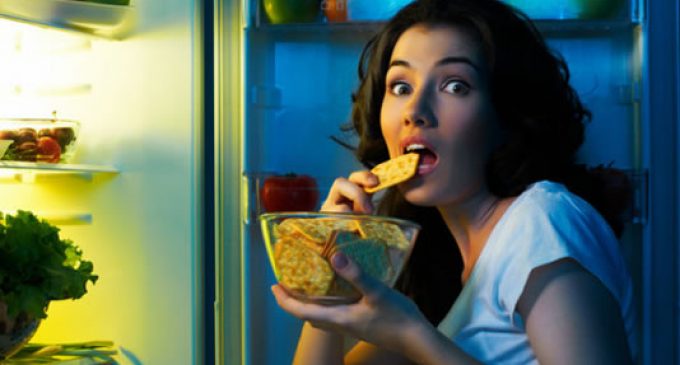Study unlocks trigger for late-night snack cravings

An evolutionary trait that helped predecessors store energy in times of food scarcity may now be the driving factor behind obesity, say researchers studying the reason behind late-night snack cravings.
An internal circadian rhythm that causes increased appetite and cravings for sweet, starchy and salty foods in the evening was historically a good thing – it helped our ancestors store more energy and have an increased chance of surviving when food became scarce.
But in our current environment – with an abundance of high-calories foods – researchers believe that the same trait of the circadian system is now responsible for increased incidence of obesity and ‘significant weight gain’.
“Our study suggests that because of the internal circadian regulation of appetite, we have a natural tendency to skip breakfast in favour of larger meals in the evening,” said Dr Steven Shea, director of the Center for Research on Occupational and Environmental Toxicology at Oregon Health & Science University and senior author on the study.
“Of course, there are many factors that affect weight gain, principally diet and exercise, but the time of eating also has an effect,” he commented.
“It seems likely that the internal circadian system helps with efficient food storage,” suggested Shea. “While this may have been valuable throughout evolution, nowadays it is likely to contribute to the national epidemic of obesity”.
Study details
Published in Obesity, the new study suggests that eating a lot in the evening can be counterproductive because the human body handles nutrients differently depending on the time of day.
The research investigated the appetite and food preference of 12 healthy non-obese adults in a 13-day laboratory stay in very dim light in which all behaviours were scheduled, including timing of meals and sleep.
“By the end of this long protocol, all of the participants’ meals and activities were spaced evenly across the day and night, allowing examination of the true internal circadian effects on appetite, while controlling for other effects on appetite including the amount of food recently consumed,” explained Dr Frank Scheer, of Brigham and Women’s Hospital and Harvard Medical School, USA – first author of the study.
Shea and his colleagues found that the internal circadian system regulated hunger, with participants feeling the least hungry in the morning (8 a.m.) and most hungry in the evening (8 p.m.).
Similar rhythms were found in appetite for types of food, such as sweet, starchy and salty, and the estimate of how much food participants could eat.
The team concluded that the internal circadian system causes an evening peak in appetite that may promote larger, higher-calorie meals before the fasting period necessitated by sleep.
Weight gain
Shea added that this high calorie intake in the evening predisposes people to store more energy – while artificial light enables people to stay up later than they probably should and often people don’t get enough sleep.
“We found with this study that the internal circadian system also likely plays a role in today’s obesity epidemic because it intensifies hunger at night,” said Shea.
“If you stay up later, during a time when you’re hungrier for high-calorie foods, you’re more likely to eat during that time,” he suggested. “You then store energy and get less sleep, both of which contribute to weight gain.”
“People who eat a lot in the evening, especially high-calorie foods and beverages, are more likely to be overweight or obese.”
Source: Obesity
Volume 21, Issue 3, Pages 421–423, doi: 10.1002/oby.20351
“The internal circadian clock increases hunger and appetite in the evening independent of food intake and other behaviors”
Authors: Frank A.J.L. Scheer, Christopher J. Morris, Steven A. Shea


































